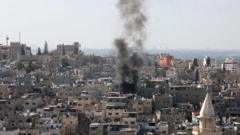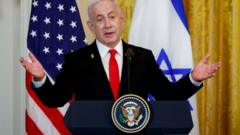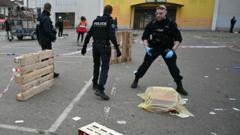Israel's Defense Minister declared the camps "empty," while the Palestinian Authority condemned the military actions as dangerous escalation amid broader regional implications.
**Escalation of Tensions: Israel Expels Residents from West Bank Camps**

**Escalation of Tensions: Israel Expels Residents from West Bank Camps**
Israel's recent military operations in the northern West Bank lead to the expulsion of thousands of residents from refugee camps as part of an intensified campaign.
The Israeli military has escalated its operations in the northern West Bank, resulting in the expulsion of residents from three refugee camps: Jenin, Tulkarm, and Nur Shams. This move comes as the Israeli Defense Forces (IDF) engages in a month-long operation, which has included the deployment of a tank division around Jenin, a significant military action not seen since 2002. Defense Minister Israel Katz announced that these camps are now "empty" and will remain under military control for the next year, aiming to prevent the return of displaced residents while combatting what it labels as terrorism.
According to statements from the IDF, the operation that commenced on January 21 has resulted in the forced displacement of approximately 40,000 Palestinians. Katz indicated that he had instructed forces to maintain a prolonged presence in the areas and directed the UN's Palestinian refugee agency (Unrwa) to cease its operations there. Meanwhile, Nabil Abu Rudeineh, spokesperson for President Mahmoud Abbas, condemned the military's actions as a “dangerous escalation" that disrupts any chance for stability in the region.
The UN has reported significant losses, with over 51 Palestinians—including children—and three Israeli soldiers killed amid the ongoing violence. The operations have also severely damaged essential infrastructure, specifically affecting water supply to tens of thousands of local residents. Additionally, Israeli Prime Minister Netanyahu's visit to Tulkarm refugee camp coincided with heightened military actions following a suspicious explosion in Tel Aviv, which authorities attributed to terrorism linked to operations in the West Bank.
The backdrop of this intensified conflict stems from Israel's military occupation established after the 1967 Six Day War. More than 160 settlements have since been built in the West Bank, housing approximately 700,000 Israeli Jews, despite the international community considering these settlements illegal, a designation that Israel disputes. With the situation more volatile than ever, the potential for further unrest looms large, complicating the delicate political landscape between Israelis and Palestinians.
According to statements from the IDF, the operation that commenced on January 21 has resulted in the forced displacement of approximately 40,000 Palestinians. Katz indicated that he had instructed forces to maintain a prolonged presence in the areas and directed the UN's Palestinian refugee agency (Unrwa) to cease its operations there. Meanwhile, Nabil Abu Rudeineh, spokesperson for President Mahmoud Abbas, condemned the military's actions as a “dangerous escalation" that disrupts any chance for stability in the region.
The UN has reported significant losses, with over 51 Palestinians—including children—and three Israeli soldiers killed amid the ongoing violence. The operations have also severely damaged essential infrastructure, specifically affecting water supply to tens of thousands of local residents. Additionally, Israeli Prime Minister Netanyahu's visit to Tulkarm refugee camp coincided with heightened military actions following a suspicious explosion in Tel Aviv, which authorities attributed to terrorism linked to operations in the West Bank.
The backdrop of this intensified conflict stems from Israel's military occupation established after the 1967 Six Day War. More than 160 settlements have since been built in the West Bank, housing approximately 700,000 Israeli Jews, despite the international community considering these settlements illegal, a designation that Israel disputes. With the situation more volatile than ever, the potential for further unrest looms large, complicating the delicate political landscape between Israelis and Palestinians.

















